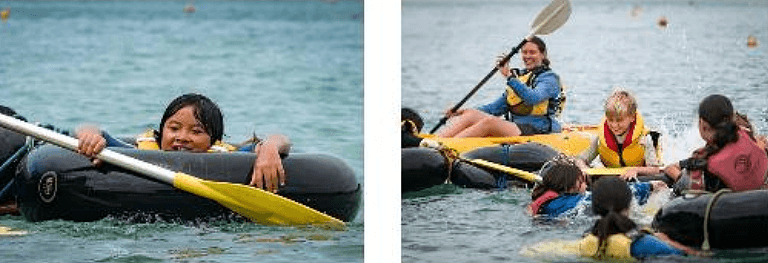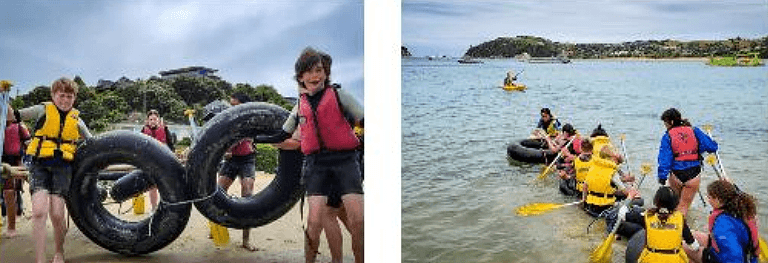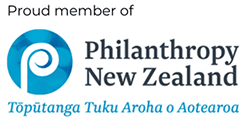
Autism NZ - Let's Play
Let’s Play is a whānau programme to bridge the gap between early development concerns with the likelihood of an autism/takiwātanga diagnosis and the start of early intervention services, empowering whānau to begin the role of enduring educator for their tamaiti.
The focus is on increasing awareness and understanding, creating more joyful interactions, play-based learning, and promoting whānau well-being using Te Whare Tapa Whā principles.
Contact: Thecla Moffatt

Graeme Dingle Foundation Nga Ara Whetu/Career Navigator 2025 -
Stewart Germann Grant
Nga Ara Whetu/Career Navigator supports young people through youth development programmes empowering youth through career navigation and mentoring to increase emotional wellbeing, resilience, self-esteem, financial literacy, self-reflection, identity and motivation, establish routines, promote healthy habits and physical fitness.
The grant is supporting programmes in the Far North, Rotorua and Wellington in areas of high social deprivation.
Contact: Courtney Keenan

Maia Centre - The Hustle Network
The Hustle Network evolved out of the Maia Centre's work with Māori and Pasifika young people involved in the Brave Learning Kaupapa through which it became clear that the most valuable support for young Māori and Pasifika young people who have made the decision to leave school before the end of the year 13 is ongoing Manaaki – support, encouragement, companionship and, where appropriate, guidance, and formal and informal learning opportunities.
Contact: Jay Allnutt
Email: jay@maiacentre.org

Porirua East Kāhui Ako - Hauora Phase 2
Hauora is a trauma-informed education programme based on the Neurosequential Model of Education in conjunction with indigenous models of wellness and healing, including mātauranga Māori.
Phase 1 demonstrated that the programme can successfully disrupt the effects of poverty and associated trauma, nurture the cognitive, social and behavioural abilities that enable other aspects of learning and build trauma-informed capabilities and practices across 12 schools in a single community.
Contact: Lynda Knight - de Blois
Email: lynda@pen.net.nz

Silverstream South Primary School - Taieri Attendance Shuttle
The grant is for the operational costs of a shuttle bus to ensure children are able to attend 3 schools where there are some challenging demographic issues such as poverty, alcoholism, drug use, domestic violence and family harm.
Contact: Greg Hurley

Storytime Foundation - First 1000 Days
Operational support to this successful initiative, is provided by this grant . Storytime Foundation works collaboratively with Plunket, tamariki ora providers, Family Start, Corrections, Police, Brainwave Trust, Little Libraries, National Library and others, to bring important information/learning as well as books and other resources to vulnerable families, and to encourage better understanding of their role in building the great brains of their babies and young children.
Evidence supports reading as a key predictor of child success and daily parent-infant reading is linked to developmental health and a broad range of positive outcomes for learning and social behaviour.
Contact: Gilli Sinclair

Tim Bray Theatre Company - Santa Claus Show
Funding for free tickets and travel for disadvantaged children to attend the show which is linked to school curriculum related activities.
Contact: Kendall Green

Weymouth Primary School – Mahi Ngātahi
Specialist sensory equipment and furniture were funded to create a safe space for neurodiverse learners.
The safe, supportive space helps students to self-regulate and to be able to access an adapted curriculum with an emphasis on inclusive education and collaboratio
Contact: Saane Faaofo Oldehaver

Whenua Iti Outdoors -
Rā Ora (Wellbeing Day) Programme
The grant is for transport to a programme for disadvantaged tamariki who missed early childhood education during the Covid years. These children have reduced social skills and resilience due to the upheaval of the Covid years. The programme activities emphasise teamwork and personal development through collaborative activities and group challenges.
Contact: Liana Richards, Education Partnerships Manager
Email: liana@whenuaiti.org.nz



Acorn Neurodiversity - Acorns to Oaks School Readiness Programme
The transition between kindergarten and primary school is critical for setting up children for success in their school career. Autistic and neurodivergent children are particularly vulnerable at this transition as they may not have the communication skills and emotional regulation which enable social relationships and pre-literacy foundations to optimally develop.
Acorn Neurodiversity and Northern Auckland Free Kindergarten Association t/a Kaitiaki Kindergartens are collaborating to pilot a new initiative, Acorns to Oaks School Readiness Programme, to support neurodivergent and developmentally disabled children with their transition to primary school.
Contact: Tami Harris

